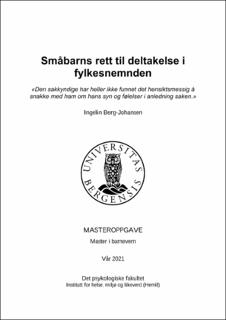Småbarns rett til deltakelse i fylkesnemnden «Den sakkyndige har heller ikke funnet det hensiktsmessig å snakke med ham om hans syn og følelser i anledning saken.»
Master thesis
Permanent lenke
https://hdl.handle.net/11250/2759422Utgivelsesdato
2021-05-20Metadata
Vis full innførselSamlinger
- Master theses [165]
Sammendrag
Sammendrag En omsorgsovertakelse er et av de mest inngripende tiltakene staten har mandat til å gjennomføre. Å plassere et barn utenfor hjemmet sitt, og bort fra sine biologiske foreldre kan få store konsekvenser både for barnet og familien. Alle barn som er i stand til å danne seg egne synspunkter, har rett til å medvirke i alle forhold som vedrører dem (Barnevernloven, 1992, §1-6). Barns rett til deltakelse skal sørge for at barn ikke blir objekt i eget liv. Formålet med studien er å undersøke hvordan det tilrettelegges for at småbarn rett til deltakelse i fylkesnemndsvedtak, jf. §4-12 - lov om omsorgsovertakelse (Barnevernloven, 1992). Småbarn blir i denne studien definert som barn i barnehagealder. Studien er en kvalitativ dokumentanalyse av 21 vedtak fra Fylkesnemnden for barnevern og sosiale saker. Materialet inneholder tolv vedtak fra 2018-2020, og ni vedtak fra 2015-2016., og omhandler totalt 32 barn. Analysemetoden som ble brukt i studien er en kombinasjon av tematisk- og innholdsanalyse. Studien viser at barn under syv år får primært sett ikke være med å delta i egen sak. Når alderen til barnet øker, blir sjansen for å delta større. Barn som får delta, slipper oftest til ved hjelp av oppnevnt talsperson jf. §7-9 (Barnevernloven, 1992). Funnene viser at barnets uttalelser vektlegges mest basert på barnets beste, troverdighet og barnevernets bevisgrunnlag. I tillegg vises det til få forskjeller mellom de to tidsperiodene i utvalget, i forhold til dokumentasjon av deltakelse. Abstrakt Taking a child into care is one of the most intrusive measures the state has a mandate to implement. Placing a child outside their home and away from their biological parents can have major consequences for both the child and the family. All children who are able to form their own views have the right to participate in all matters concerning the child (Child Welfare Act, 1992, §1-6). Children's right to participation must ensure that children do not become objects in their own lives. The purpose of the study is to investigate how it is arranged for young children to have the right to participate in county council decisions, cf. §4-12 – law for taking child into care (CWA, 1992). In this study, young children are defined as children of kindergarten-age. The study is a qualitative document analysis of 21 decisions from the Norwegian County Board for Child Welfare and Social Affairs. The material contains twelve decisions from 2018-2020, and nine decisions from 2015-2016, and deals with a total of 32 children. The analysis method used in the study is a combination of thematic and content analysis. The study shows that children under the age of seven, primarily are not allowed to participate in their own case. As the age of the child increases, the chance of participating increases. Children who are allowed to participate are most often admitted with the help of an appointed spokesperson, cf. §7-9 (CWA, 1992). The findings show that the child's statements are emphasized most based on the child's best interests, credibility, and the child welfare service's evidence base. In addition, there are few differences between the two time periods in the sample, in relation to documentation of participation.
